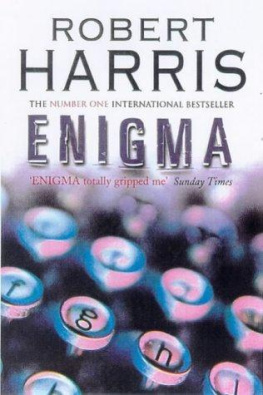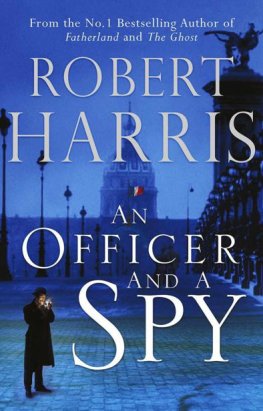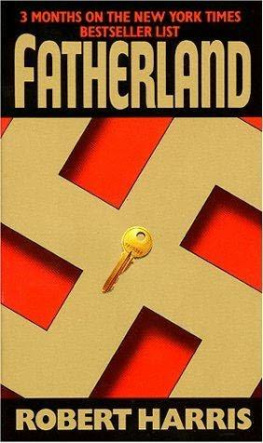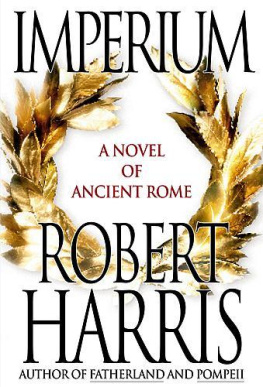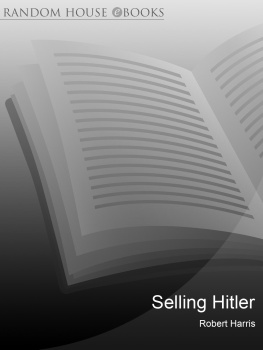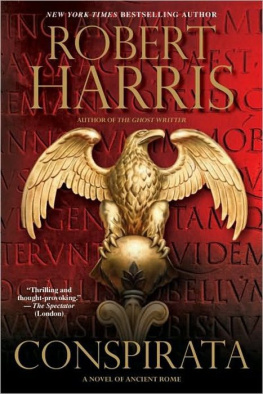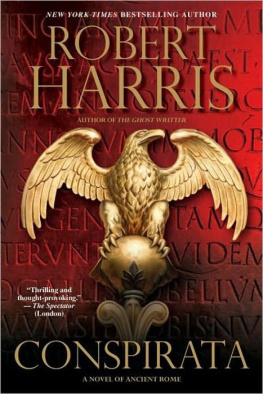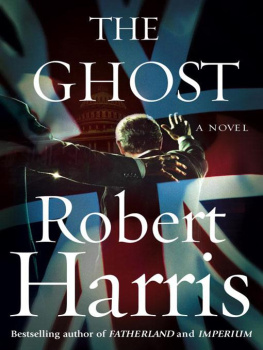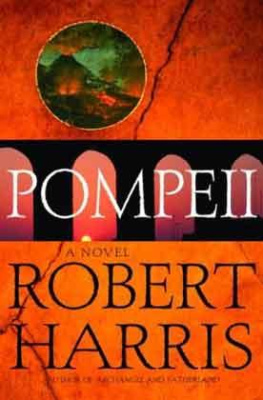Robert Harris - Enigma
Here you can read online Robert Harris - Enigma full text of the book (entire story) in english for free. Download pdf and epub, get meaning, cover and reviews about this ebook. year: 2009, publisher: Arrow, genre: Detective and thriller. Description of the work, (preface) as well as reviews are available. Best literature library LitArk.com created for fans of good reading and offers a wide selection of genres:
Romance novel
Science fiction
Adventure
Detective
Science
History
Home and family
Prose
Art
Politics
Computer
Non-fiction
Religion
Business
Children
Humor
Choose a favorite category and find really read worthwhile books. Enjoy immersion in the world of imagination, feel the emotions of the characters or learn something new for yourself, make an fascinating discovery.
- Book:Enigma
- Author:
- Publisher:Arrow
- Genre:
- Year:2009
- Rating:4 / 5
- Favourites:Add to favourites
- Your mark:
- 80
- 1
- 2
- 3
- 4
- 5
Enigma: summary, description and annotation
We offer to read an annotation, description, summary or preface (depends on what the author of the book "Enigma" wrote himself). If you haven't found the necessary information about the book — write in the comments, we will try to find it.
Enigma — read online for free the complete book (whole text) full work
Below is the text of the book, divided by pages. System saving the place of the last page read, allows you to conveniently read the book "Enigma" online for free, without having to search again every time where you left off. Put a bookmark, and you can go to the page where you finished reading at any time.
Font size:
Interval:
Bookmark:
Enigma - Robert Harris
Author's Note
This novel is set against the background of an actual historical event. The German naval signals quoted in the text are all authentic. The characters, however, are entirely fictional.
'It looks as if BletchleyPark is the single greatest achievement of Britain during 1939-45, perhaps during this century as a whole.'
George Steiner
'A mathematical proof should resemble a simple and clear-cut constellation, not a scattered cluster in the Milky Way. A chess problem also has unexpectedness, and a certain economy; it is essential that the moves should be surprising, and that every piece on the board should play its part.'
G.H. Hardy, A Mathematician's Apology
ONE
WHISPERS
WHISPERS : the sounds made by an enemy wireless transmitter immediately before it begins to broadcast a coded message.
A Lexicon of Cryptography ('Most Secret', BletchleyPark, 1943)
CAMBRIDGE IN THE fourth winter of the war: a ghost town.
A ceaseless Siberian wind with nothing to blunt its edge for a thousand miles whipped off the North Sea and swept low across the Fens. It rattled the signs to the air-raid shelters in Trinity New Court and battered on the boarded-up windows of King's College Chapel. It prowled through the quadrangles and staircases, confining the few dons and students still in residence to their rooms. By mid-afternoon the narrow cobbled streets were deserted. By nightfall, with not a light to be seen, the university was returned to a darkness it hadn't known since the Middle Ages. A procession of monks shuffling over MagdaleneBridge on their way to Vespers would scarcely have seemed out of place.
In the wartime blackout the centuries had dissolved.
It was to this bleak spot in the flatlands of eastern England that there came, in the middle of February 1943, a young mathematician named Thomas Jericho. The authorities of his college, King's, were given less than a day's notice of his arrival - scarcely enough time to reopen his rooms, put sheets on his bed, and have more than three years' worth of dust swept from his shelves and carpets. And they would not have gone to even that much trouble, it being wartime and servants so scarce - had not the Provost himself been telephoned at the Master's Lodge by an obscure but very senior official of His Majesty's Foreign Office, with a request that 'Mr Jericho be looked after until he is well enough to return to his duties'.
'Of course,' replied the Provost, who couldn't for the life of him put a face to the name of Jericho. 'Of course. A pleasure to welcome him back.'
As he spoke, he opened the college register and flicked through it until he came to: Jericho, T. R. G.; matriculated, 1935; Senior Wrangler, Mathematics Tripos, 1938; Junior Research Fellow at two hundred pounds a year; not seen in the university since the outbreak of war.
Jericho? Jericho? To the Provost he was at best a dim memory, a fuzzy adolescent blob on a college photograph. Once, perhaps, he would have remembered the name, but the war had shattered the sonorous rhythm of intake and graduation and all was chaos - the Pitt Club was a British Restaurant, potatoes and onions were growing in the gardens of St John's...
'He has recently been engaged upon work of the gravest national importance,' continued the caller. 'We would appreciate it if he were not disturbed.'
'Understood,' said the Provost. 'Understood. I shall see to it he is left alone.'
'We are obliged to you.'
The official rang off. 'Work of the gravest national importance', by God... The old man knew what that meant. He hung up and looked thoughtfully at the receiver for a few moments, then went in search of the domestic bursar.
A Cambridge college is a. village, with a village's appetite for gossip - all the keener when that village is nine-tenths empty - and the return of Jericho provoked hours of analysis among the college staff.
There was, for a start, the manner of his arrival - a few hours after the call to the Provost, late on a snowy night, swaddled in a travelling rug, in the back of a cavernous official Rover driven by a young chauffeuse in the dark blue uniform of the Women's Royal Navy. Kite, the porter, who offered to carry the visitor's bags to his rooms, reported that Jericho clung to his pair of battered leather suitcases and refused to let go of either, even though he looked so pale and worn out that Kite doubted he would make it up the spiral staircase unaided.
Dorothy Saxmundham, the bedder, saw him next, when she went in the following day to tidy up. He was propped on his pillows staring out at the sleet pattering across the river, and he never turned his head, never even looked at her, didn't seem to know she was there, poor lamb. Then she went to move one of his cases and he was up in a flash - 'Please don't touch that, thank you so much, Mrs Sax, thank you' - and she was out on the landing in a quarter of a minute.
He had only one visitor: the college doctor, who saw him twice, stayed for about fifteen minutes on each occasion, and left without saying a word.
He took all his meals in his room for the first week - not that he ate very much, according to Oliver Bickerdyke, who worked in the kitchens: he took up a tray three times a day, only to take it away again an hour later, barely touched. Bickerdyke's great coup, which led to at least an hour of speculation around the coke stove in the Porter's Lodge, was to come upon the young man working at his desk, wearing a coat over his pyjamas, a scarf and a pair of mittens. Normally, Jericho 'sported his oak' - that is to say, he kept the heavy outer door to his study firmly shut - and called politely for his tray to be left outside. But on this particular morning, six days after his dramatic arrival, he had left it slightly ajar. Bickerdyke deliberately brushed the wood lightly with his knuckles, so quietly as to be inaudible to any living creature, save possibly a grazing gazelle, and then he was across the threshold and within a yard of his quarry before Jericho turned round. Bickerdyke just had time to register piles of papers ('covered in figures and circuits and Greek and suchlike') before the work was hastily covered up and he was sent on his way. Thereafter the door remained locked.
Listening to Bickerdyke's tale the next afternoon, and not wishing to be outdone, Dorothy Saxmundham added a detail of her own. Mr Jericho had a small gas fire in his sitting room and a grate in his bedroom. In the grate, which she had cleaned that morning, he had obviously burned a quantity of paper.
There was silence while this intelligence was digested.
'Could be The Times,' said Kite eventually. 'I puts a copy of The Times under his door every morning.'
No, declared Mrs Sax. It was not The Times. They were still in a pile by the bed. 'He doesn't seem to read them, not as I've noticed. He just does the crosswords.'
Bickerdyke suggested he was burning letters. 'Maybe love letters,' he added, with a leer.
'Love letters? Him? Get away.' Kite took off his antique bowler hat, inspected its frayed brim, then replaced it carefully on his bald head. 'Besides, he ain't had any letters, not a single one, not since he's been here.'
And so they were forced to the conclusion that what Jericho was burning in his grate was his work - work so secret, nobody could be allowed to see even a fragment of the waste. In the absence of hard fact, fantasy was piled upon fantasy. He was a government scientist, they decided. No, he worked in Intelligence. No, no -he was a genius. He had had a nervous breakdown. His presence in Cambridge was an official secret. He had friends in high places. He had met Mr Churchill. He had met the King...
In all of which speculation, they would have been gratified to learn, they were absolutely and precisely correct.
Font size:
Interval:
Bookmark:
Similar books «Enigma»
Look at similar books to Enigma. We have selected literature similar in name and meaning in the hope of providing readers with more options to find new, interesting, not yet read works.
Discussion, reviews of the book Enigma and just readers' own opinions. Leave your comments, write what you think about the work, its meaning or the main characters. Specify what exactly you liked and what you didn't like, and why you think so.

